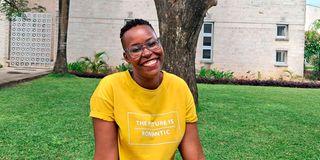Premium
I learnt valuable skills from raising my autistic child

What you need to know:
- People said my son was cursed, that I did something when I was pregnant to warrant his condition, and because he is semi-verbal, that I could only pray for him to one day recover and speak "correctly".
- Many do not believe he's autistic because on the outside he looks like a normal child.
Twelve years ago, when Yvonne Pashua Mwangi, 38, welcomed her second child, she was elated. But, the mother of three was not to savour that joy for long because as the child grew, she noticed some strange behaviour.
Yvonne noticed that the boy was making repetitive actions and vocalising specific words over and over. She decided to seek an expert’s opinion to find out what was wrong, and that is when a new world unfolded.
"I was told the child had autism. I was devastated. At the time, I did not know what that was. I went through the five stages of mourning. You see, autism is described as a silent disability and many do not know much about it. I fell into depression, was diagnosed with anxiety disorder, developed suicidal thoughts, and blamed myself for my son's condition.
I have a nephew who is deaf but autism was a new thing to our family. Finding the right support in a society where ignorance and superstition are attached to disability was hard.
People said my son was cursed, that I did something when I was pregnant to warrant his condition, and because he is semi-verbal, that I could only pray for him to one day recover and speak "correctly". Many do not believe he's autistic because on the outside he looks like a normal child.
To better understand autism and quash the myths and misconceptions, I did my research. This has helped me support other parents with autistic children and caregivers on how to handle autistic cases.
I have also taught my son to look and feel his best. Autism or disability should never be seen negatively. As much as I wish my son would wake up one day and speak to me, I know that may never happen. I focus on helping him develop an expressive language through art, music and assistive devices.
Because he is homeschooled, I am able to work with his tutor and tailor-make a curriculum that focuses on his skills and capabilities, and not necessarily his age. Currently, he's in Grade Two in mathematics and at the beginners’ stage in language. He has also enrolled in swimming.
He has made improvements over the years. At first, his case was severe but currently, it is classified as mild. Early and constant intervention has led to this. I usually have him assessed every four years.
Any parent with an autistic child or relative can feel embarrassed or ashamed. In other forms of disabilities, parents, caregivers or guardians can control the behaviour of the child, but it is a different case with autism.
Children with this condition may experience stimming (repetitive behaviour) and have frequent meltdowns. None are good. My son’s stimming manifests as regular, loud and uncomfortable outbursts of laughter. I have to explain to people why he does that and make them understand that it cannot be controlled.
Despite this, many still have negative mindsets regarding the autistic persons. We cannot change their minds, but can only create more awareness through sharing our stories in educating and empowering our communities. This way we will create a conducive environment for our children to thrive in.
Parenting an autistic child has its highs and lows. My joy is watching him discover new ways of tackling challenges. I learn more about him every day. I have had to take time to understand what makes him happy, sad, frustrated or excited. He is curious to learn and discover things, so I constantly create opportunities for him to explore his environment. Seeing him grow to be more independent is joyous.
Raising such a child can be a lonely journey. Also, handling his meltdowns can be tasking. Then there's the reality that I may never have conversations with him. He had never called me "mum" and I miss hearing that.
There's a misconception that autistic children are all the same, but this is a spectrum disorder and you'll never meet autistic persons who exhibit the same behaviour or mannerisms. Not all autistic individuals self-harm or elope. My son doesn't fall under the category of self-harming or violent, but he tends to wander off so he needs around-the-clock supervision.
Raising an autistic child came as a blessing. I've learned new skills and developed the virtues of patience, kindness, and understanding. I don’t shy from seeking professional help, and I try to be there for others.
Every month I bring together parents with autistic children, guardians and caregivers in a virtual group meeting called Mosaic Minds. This platform allows us to discuss, vent, share and find the understanding and support we need as we raise and nurture our differently-abled children.





